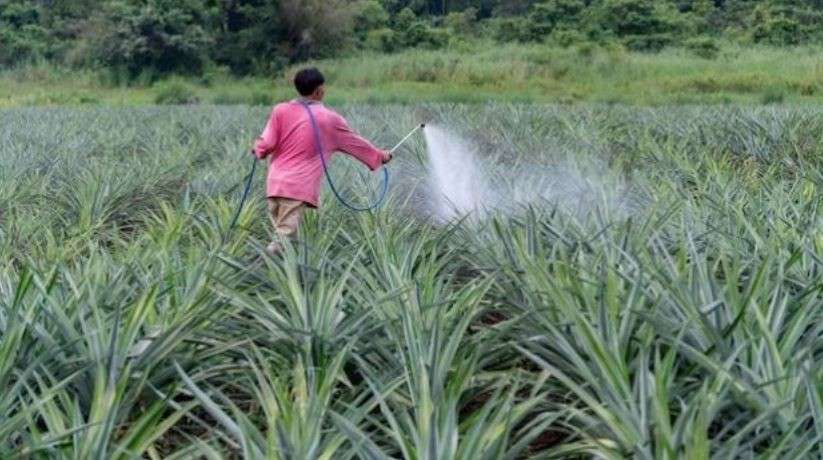
Choosing the Ideal Fertilizer for Pineapple Plants
Pineapple plants, with their exotic allure and sweet rewards, add a tropical touch to any garden. To ensure these vibrant fruits reach their full potential, understanding the right fertilizer for pineapple plants is crucial. In this comprehensive guide, we’ll delve into the intricacies of fertilizing pineapple plants, covering everything from nutrient requirements to application techniques. Whether you’re a seasoned gardener or a pineapple enthusiast, this article will equip you with the knowledge to nurture your pineapple plants for optimal growth and abundant harvests.
Table of Contents
ToggleUnderstanding Pineapple Plant Nutrient Requirements
A. Overview of pineapple plant growth stages and nutrient needs
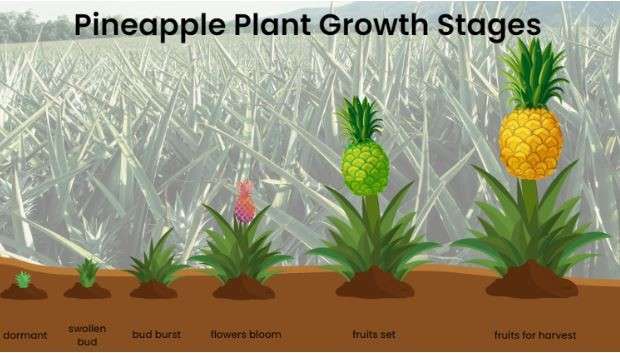
Pineapple plants go through different growth stages, and their nutrient needs change during each stage. In the initial growth stage, the plant requires high levels of nitrogen to promote leaf and stem development. As the plant matures and begins to produce fruit, it requires less nitrogen and more phosphorus and potassium to support fruit development and overall plant health. It’s important to choose a fertilizer that provides the right balance of these essential nutrients for each stage of the plant’s growth. By understanding the specific nutrient requirements of pineapple plants at different stages, you can select the best fertilizer to meet those needs and promote healthy growth and fruit production.
B. Essential nutrients for pineapple plants: nitrogen, phosphorus, potassium, and micronutrients
Are essential for the healthy growth of pineapple plants. Nitrogen is important for leaf and stem development, phosphorus supports fruit development, and potassium helps with overall plant health and disease resistance. In addition to these macronutrients, pineapple plants also require micronutrients such as iron, magnesium, and zinc. These micronutrients are essential for the proper functioning of the plant’s metabolic processes and overall health. When choosing a fertilizer for your pineapple plants, look for one that provides a balanced combination of these essential nutrients to support healthy growth and fruit production. It’s also important to consider the pH level of the soil and any specific deficiencies in nutrients that may be present in your growing conditions. By understanding the nutrient requirements of pineapple plants and choosing the right fertilizer, you can ensure the health and productivity of your plants.
Types of Fertilizers for Pineapple Plants
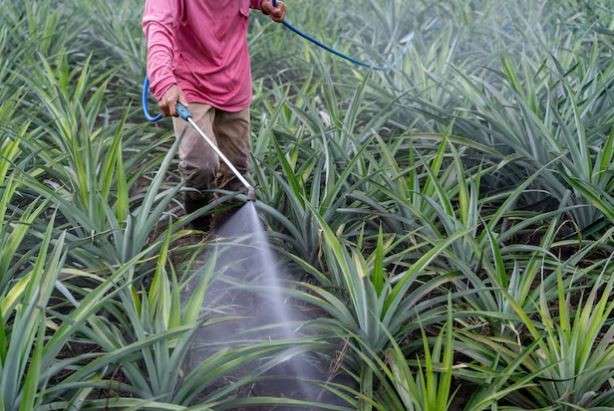
A. Organic fertilizers: benefits and considerations for natural nutrient supplementation
When it comes to fertilizing pineapple plants, it’s important to consider the specific nutrient requirements of the plant. Pineapples need a balanced combination of macro and micronutrients, including nitrogen, phosphorus, potassium, iron, magnesium, and zinc. Organic fertilizers can be a great option for providing these essential nutrients. They are derived from natural sources and can improve soil health and fertility over time. Additionally, organic fertilizers release nutrients slowly, which can prevent nutrient burn and leaching. When choosing an organic fertilizer for your pineapple plants, look for one that provides a balanced combination of essential nutrients and is suitable for your specific growing conditions. It’s also important to consider the pH level of the soil and any specific nutrient deficiencies that may be present. Overall, using organic fertilizers can help support the health and productivity of your pineapple plants in a natural and sustainable way.
B. Synthetic fertilizers: advantages and disadvantages of chemical-based formulations
Chemical-based fertilizers can provide immediate and targeted nutrients to pineapple plants, helping them to grow quickly and produce fruit. These types of fertilizers are also easily accessible and can be tailored to specific nutrient needs. However, the use of synthetic fertilizers can lead to soil and water pollution if not applied properly, and overuse can harm beneficial soil organisms. Additionally, synthetic fertilizers can cause nutrient imbalances in the soil and may not promote long-term soil health and fertility. It’s important to carefully follow application instructions and consider the potential environmental impacts when using chemical-based fertilizers for pineapple plants.
Factors to Consider When Choosing Fertilizer
1.Soil type and pH: understanding soil characteristics and their influence on nutrient availability
Is essential when choosing the best fertilizer for pineapple plants. Pineapples thrive in well-draining soil with a slightly acidic to neutral pH level. Knowing the pH level of your soil can help you determine which nutrients are available to the plants and which may need to be supplemented through fertilizer. Additionally, the texture and composition of the soil can impact nutrient retention and uptake by the plants. Sandy soil, for example, may require more frequent fertilization than clay soil due to its lower nutrient retention capacity. It’s important to conduct a soil test to determine the specific needs of your pineapple plants and make informed fertilizer choices based on the results.
2.Climate and growing conditions: selecting fertilizers suitable for different climates and environments
Climate and growing conditions are crucial for the healthy growth of pineapple plants. Different climates and growing conditions can affect the availability of nutrients in the soil, so it’s important to choose a fertilizer that can supplement any deficiencies. For example, if you live in an area with heavy rainfall, you may need a fertilizer that can withstand leaching and provide consistent nutrient availability to the plants. On the other hand, if you’re in a drier climate, you may need a fertilizer that can help retain moisture in the soil and provide nutrients to the plants during dry spells. Understanding the specific needs of your growing conditions will help you choose the best fertilizer for your pineapple plants. By considering factors such as soil type, pH, and climate, you can ensure that your pineapple plants receive the nutrients they need to thrive and produce healthy, delicious fruit.
Popular Fertilizer Brands and Products
A. Overview of reputable fertilizer brands offering formulations suitable for pineapple plants
- Espoma Organic Pine-Tone Fertilizer: This organic, slow-release fertilizer is ideal for pineapple plants, providing essential nutrients and promoting healthy growth without the risk of leaching or harming the environment.
- Miracle-Gro Water Soluble All Purpose Plant Food: This popular and widely available fertilizer is suitable for pineapple plants, offering a balanced blend of nutrients that can be easily absorbed by the plants to support healthy and vigorous growth.
- Jobe’s Organics Fruit & Citrus Fertilizer Spikes: These convenient fertilizer spikes offer a natural and organic solution for feeding pineapple plants, providing a slow-release formula that can deliver essential nutrients directly to the root zone for sustained growth and fruit production.
- Scotts Turf Builder Lawn Food: While designed for lawns, this fertilizer can also be beneficial for pineapple plants, as it contains essential nutrients like nitrogen, phosphorus, and potassium that can support healthy growth and fruit development.
When choosing a fertilizer for your pineapple plants, consider factors such as the nutrient content, application method, and compatibility with your specific growing conditions. It’s important to follow the manufacturer’s instructions for application rates and frequency to ensure the best results for your pineapple plants. With the right fertilizer, you can provide your pineapple plants with the nutrients they need to thrive and produce delicious fruit.
Application Methods and Timing
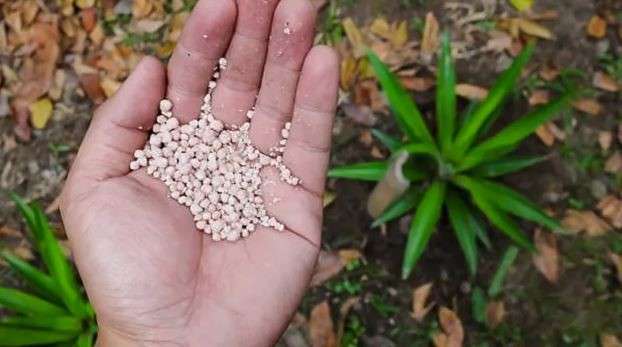
A. Guidelines for applying fertilizer to pineapple plants: rates, frequency, and timing
When applying fertilizer to pineapple plants, it is important to consider the rates, frequency, and timing. Different fertilizers have different application guidelines, so it is important to follow the manufacturer’s instructions. For example, Espoma Organic Pine-Tone Fertilizer is an organic, slow-release fertilizer that provides essential nutrients without the risk of leaching or harming the environment. Miracle-Gro Water Soluble All Purpose Plant Food offers a balanced blend of nutrients that can be easily absorbed by pineapple plants. Jobe’s Organics Fruit & Citrus Fertilizer Spikes provide a natural and organic solution for feeding pineapple plants with a slow-release formula. Scotts Turf Builder Lawn Food, while designed for lawns, can also be beneficial for pineapple plants as it contains essential nutrients like nitrogen, phosphorus, and potassium. When choosing a fertilizer for your pineapple plants, consider factors such as the nutrient content, application method, and compatibility with your specific growing conditions. It’s important to follow the manufacturer’s instructions for application rates and frequency to ensure the best results for your pineapple plants. With the right fertilizer and proper application, you can provide your pineapple plants with the nutrients they need to thrive and produce delicious fruit.
B. Techniques for incorporating fertilizer into soil or applying it to the surface
Firstly, Miracle-Gro Water Soluble All Purpose Plant Food is a great option for pineapple plants as it provides a balanced blend of nutrients that can be easily absorbed. Additionally, Jobe’s Organics Fruit & Citrus Fertilizer Spikes offer a natural and organic solution with a slow-release formula to feed pineapple plants. Scotts Turf Builder Lawn Food, while designed for lawns, also contains essential nutrients like nitrogen, phosphorus, and potassium that can benefit pineapple plants. When choosing a fertilizer, consider the nutrient content, application method, and compatibility with your specific growing conditions. It’s important to follow the manufacturer’s instructions for application rates and frequency to ensure the best results for your pineapple plants. Whether you incorporate the fertilizer into the soil or apply it to the surface, the goal is to provide your pineapple plants with the nutrients they need to thrive and produce delicious fruit.
Tips for Fertilizer Management and Maintenance
A. Monitoring soil nutrient levels and pineapple plant health over time
Is essential for successful fertilization. Regular testing of the soil can help you determine which nutrients are lacking and which fertilizers will be most effective. Keep an eye on the overall health and growth of your pineapple plants to assess if they are receiving the proper nutrients. Techniques for incorporating fertilizer into the soil or applying it to the surface can vary depending on the type of fertilizer you choose. Some fertilizers may need to be mixed into the soil before planting, while others can be applied directly to the surface. It’s important to follow the instructions provided by the manufacturer to ensure that the fertilizer is properly applied. Additionally, be mindful of using the appropriate amount of fertilizer to avoid overfeeding or underfeeding your pineapple plants. By monitoring soil nutrient levels, plant health, and following proper fertilization techniques, you can help your pineapple plants thrive and produce delicious fruit.
Organic Fertilizer Options for Pineapple Plants
A. Overview of natural fertilizers suitable for organic pineapple cultivation:
When it comes to fertilizing your pineapple plants, natural and organic options are the best choice for organic cultivation. Some natural fertilizers that are suitable for pineapple plants include compost, manure, and fish emulsion. These options provide essential nutrients to the soil and promote healthy growth without the use of synthetic chemicals. Additionally, organic fertilizers support the overall health of the soil and the surrounding ecosystem, making them an environmentally friendly choice for pineapple cultivation. When choosing a natural fertilizer for your pineapple plants, consider the specific nutrient needs of your soil and the growth stage of your plants. It’s important to choose a fertilizer that provides the necessary balance of nutrients, including nitrogen, phosphorus, and potassium, to support healthy growth and fruit production. By selecting the right natural fertilizer for your pineapple plants, you can ensure that they receive the nutrients they need to thrive in an organic and sustainable way.
Troubleshooting Common Fertilizer Issues
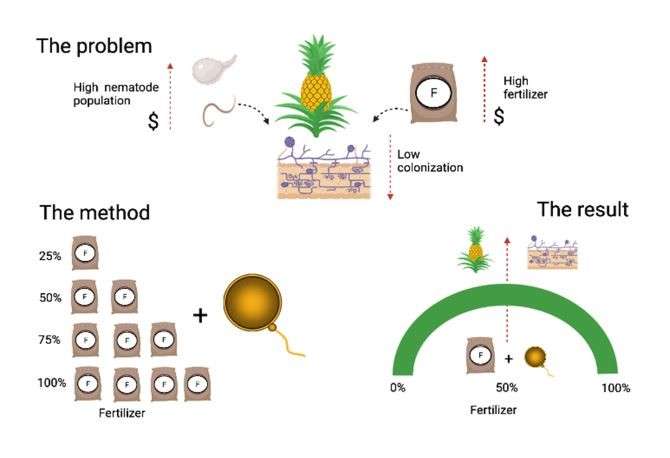
A. Symptoms of over-fertilization and nutrient toxicity in pineapple plants
Over-fertilization and nutrient toxicity in pineapple plants can have detrimental effects on their growth and health. Symptoms of over-fertilization include stunted growth, yellowing of leaves, and burned leaf tips. This can be caused by the excessive buildup of salts in the soil from the overuse of chemical fertilizers. To prevent these issues, it’s important to carefully follow the recommended application rates for any fertilizer and monitor the health and growth of your pineapple plants regularly. If you notice any signs of nutrient toxicity, such as wilting or discoloration of leaves, it’s important to flush the soil with water to remove any excess salts and allow the plants to recover. Using natural and organic fertilizers can also help minimize the risk of nutrient toxicity and ensure the long-term health of your pineapple plants. By being mindful of the potential risks of over-fertilization and nutrient toxicity, you can maintain a healthy and thriving pineapple garden.
B. Strategies for correcting nutrient imbalances and addressing fertilizer-related problems
include conducting soil tests to determine the specific nutrient needs of your pineapple plants and adjusting your fertilizer application accordingly. If you notice any signs of nutrient deficiencies, such as yellowing or stunted growth, you can choose a fertilizer that is specifically formulated to address these issues. Additionally, you can use natural remedies such as compost or organic matter to provide a balanced and sustainable source of nutrients for your plants. It’s also important to monitor the pH level of the soil and make any necessary adjustments to ensure that your pineapple plants can effectively absorb the nutrients from the fertilizer. By being proactive and attentive to the specific needs of your pineapple plants, you can prevent and correct nutrient imbalances and ensure their overall health and productivity.
In conclusion, when choosing a fertilizer for your pineapple plants, it’s important to consider the specific nutrient needs of the plant and the soil conditions in which it is growing. Look for a balanced fertilizer with a higher potassium content to promote fruit production. Additionally, consider using organic fertilizers to avoid chemical buildup in the soil. Proper application and timing of fertilizer is also crucial for optimal growth and fruit production. By choosing the right fertilizer and applying it correctly, you can ensure healthy and productive pineapple plants.
Frequently Asked Question
The ideal fertilizer for pineapple plants is one that is high in potassium, such as a 10-10-10 or 20-20-20 blend. This will help promote fruit development and overall plant health.
Pineapple plants should be fertilized every 6-8 weeks during the growing season, which is typically spring and summer. It’s important not to over-fertilize, as this can harm the plants.
Yes, organic fertilizers can be a great option for pineapple plants. Look for organic fertilizers that are specifically formulated for fruiting plants, and follow the application instructions on the package.
Either liquid or granular fertilizer can be used for pineapple plants, as long as they contain the necessary nutrients. Some gardeners prefer liquid fertilizers for easier application, while others prefer granular for longer-lasting effects.
In addition to potassium, pineapple plants also benefit from fertilizers that contain magnesium, calcium, and sulfur. Look for a fertilizer blend that includes these essential nutrients for optimal plant growth.
Yes, you can create your own fertilizer for pineapple plants using compost, aged manure, and other natural ingredients. Just be sure to research and follow proper guidelines for creating homemade fertilizers to ensure the health of your plants.
Avoid using fertilizers that are high in nitrogen, as this can lead to excessive foliage growth at the expense of fruit production. Also, be cautious of using fertilizers with high levels of phosphorus, as this can negatively impact the soil pH.
Look for signs of nutrient deficiency, such as yellowing leaves or stunted growth. A soil test can also help determine if your pineapple plants are lacking in specific nutrients and in need of fertilization.
